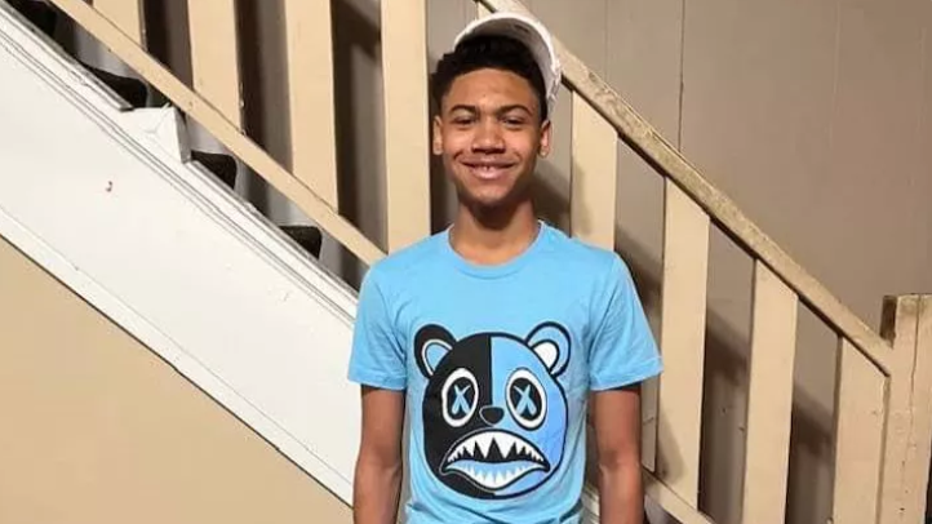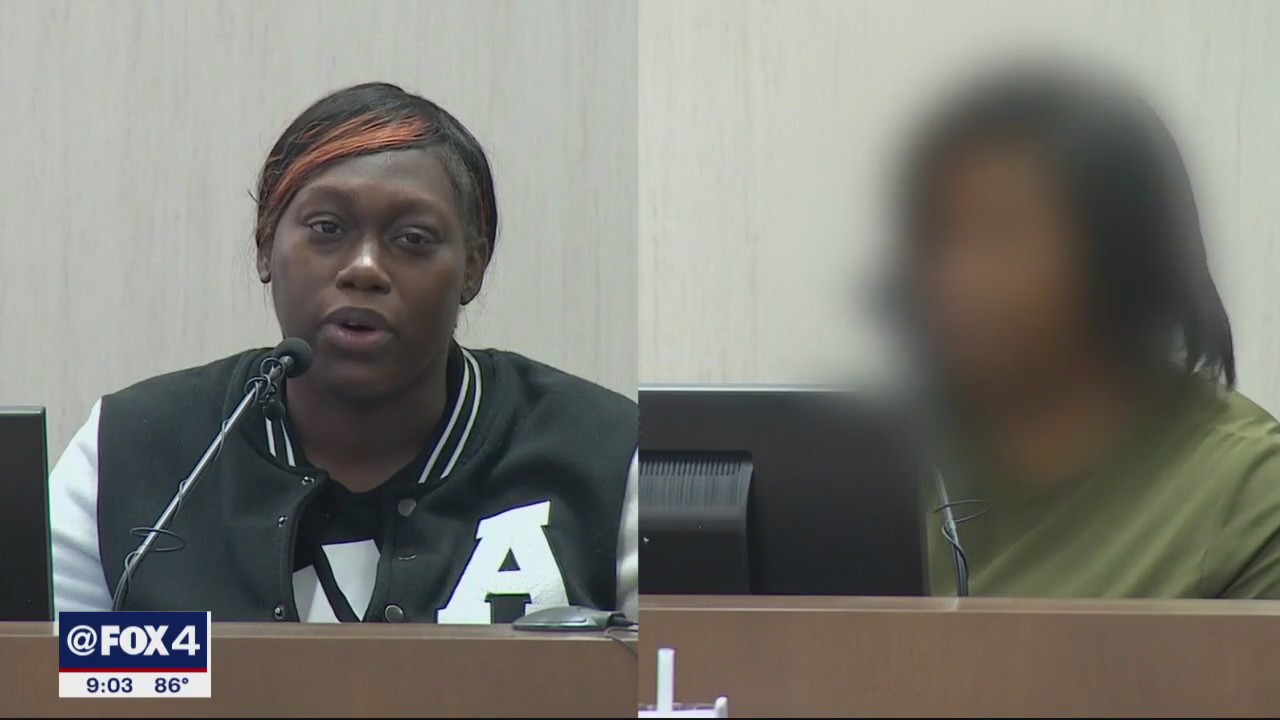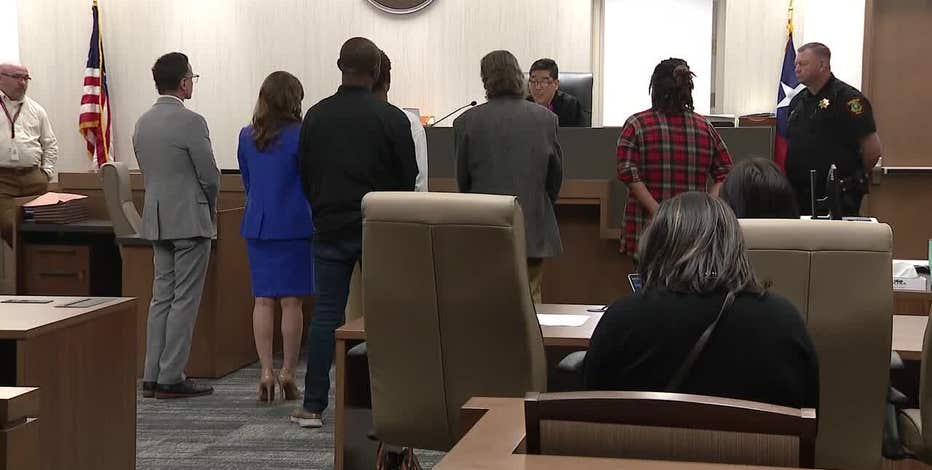Arlington Lamar HS shooting trial: 'I'm stuck in this nightmare,' victim's mother says

Testimony wraps up in Arlington Lamar HS shooting trial
Dramatic and emotional testimony in the trial of a teenager who shot and killed another student at Arlington Lamar High School has wrapped up.
ARLINGTON, Texas - Dramatic and emotional testimony in the trial of a teenager who shot and killed another student at Arlington Lamar High School has wrapped up.
The now 16-year-old shooter is a minor, so FOX 4 will not release his name. He has pleaded "True" to capital murder and three counts of attempted murder and faces up to 40 years in prison.
Featured
16-year-old Arlington Lamar HS shooter to be sentenced for capital murder
For the first time, a possible motive has been revealed for the deadly school shooting at Arlington Lamar High School last March.
The defense called their witnesses. One included a clinical director, with the juvenile justice department, in an effort to convince the jury that the teen can be rehabilitated at a state juvenile facility.
However, the prosecution continues to push the teen needs a stiff punishment.
Video shown to the jury shows the boy back in August attacking a detention officer and trying to escape.
The March 2023 shooting killed 16-year-old Ja'Shawn Poirier and injured a second student.

Ja'Shawn Poirier
We learned Wednesday that the shooter texted his dad right after the shooting, telling him to call the police because there was a shooting at the school.
The mother of the shooter, who lives in Baton Rouge, Louisiana, took the stand Wednesday and said there are no excuses for what her son did. She admitted her son should face consequences.
"Accountability has to be given. A life was taken and even though this is my child, I love him and accountability has to be given," said the teen's mother.

Moms of victim, killer testify in school shooting trial
The mothers of both the shooter and murder victim from the Arlington Lamar High School shooting testified at the defendant's sentencing trial.
She testified it was his decision to come to North Texas from Louisiana and his father wanted him.
Testimony in court alleges the shooter was retaliating for a sexual assault attack in school.
Arlington police testified the claims were unsubstantiated.
The teen's mother also said that he never mentioned sexual assault to her. Prosecutors asked her mother if she saw any changes in her son’s behavior when he visited her in Louisiana in October, which was the last time she saw him.
"He showed no signs, that’s all i can say. He showed no signs," she said. "If something happened, I’ve always said he hid it. He hid it very well."
She testified she and her son had a close relationship and would text every day, which is a stark contrast to the difficult relationship the defense team said the teen had with his parents.
[PROSECUTOR: "So if representation was that you weren't involved, you didn't care, that wouldn't be true or accurate, would it?"]
"No sir," said the mother.
In cross examination, the defense pointed out the teen visited his mother in Louisiana before the date he claimed he was sexually assaulted.
The defense asked the teenager’s mother about the contentious family dynamic in Louisiana before her son moved in with his father in Texas five years ago.
[ATTORNEY: "Arguing?"]
"Yes," she said.
[ATTORNEY: Fighting?"]
"Yes," she said.
[ATTORNEY: "Violence?"]
"Yes," she said.
The teen’s mother also said she wrote her son in jail three times after he was arrested, but she never heard back.
That’s why she said she never visited him.
It was disclosed the teenager was given nearly 30 chances to call his mother from jail, but refused.
Before her testimony, prosecutors showed the boy repeatedly had disciplinary write-ups for refusing to follow the rules, especially one week in May and the week of August 18 when the trial was first set.
Surveillance was shown in court of the teen trying to escape the juvenile detention facility last month. This was the day jury selection was supposed to begin in the trial.
Early in the morning, the teen requested toilet paper from the staff. Cameras caught a detention officer bringing the boy toilet paper being pushed by the teen.

The officer backed up, the teen - in shorts and a t-shirt - picked up the keys, ran to a rec area, but couldn't get through that door.
The detention officer followed the boy, who turned and hit him, knocking him down, before hitting him in the head with the keys.
The officer picked up a mop and swung it at the teen.
A second detention officer, Michael Blanford, entered the area and went after the boy.
Blanford eventually restrained him and got him back to his room, where the teen claimed he was the one that was attacked.
"He stated that [the detention officer] opened my door and started punching me in my face," said Blanford.
Jurors could not see that did not happen.
Tarrant County Juvenile Deputy Director Jarreau Grant testified the detention officer suffered a concussion and also admitted he did not follow policy, which requires two officers to be present when opening the door of a detainee.
[ATTORNEY: "It's a high security facility back there?"]
"Yes, sir," said Grant.
[ATTORNEY: "He wasn't going anywhere was he? He was not going to get out of that facility based on that video was he?"]
"I don't think he would have," said Grant.
[ATTORNEY: "TCJD just characterized it as an attempted escape because he was out of his room when he wasn't supposed to be?"]
"Yes, sir," said Grant.

The state's final witness was Roshone Jacob, the mother of Ja'Shawn Poirier.
"It's been very hard because I'm technically still trying to wrap my mind around it, and I'm stuck in this nightmare, trying to come out of it," Jacob said.
She recalled what she went through on the day her son was killed.
"All I remember is screaming and crying. I told my boss I had to leave and I ran out of the building," she said.
The other side of this nightmare, the great aunt of the boy who took Ja'Shawn Poirier's life.
She tearfully testified she saw signs something was wrong with the boy and tried to get his father to get him help.
"We gave him some ideas and things like that, but he just thought that he, you know, he loves his son. He just thought that he was just a shy kid, because he's shy," said Carolyn Jones.
She testified she saw signs something was wrong with the boy recently, wishing she would’ve stepped in sooner.
"I feel guilty that he didn’t feel secure enough to talk about whatever was going on in his life," Jones added. "I noticed he got more withdrawn and isolating a little more. The family had seen less of him."
One of the witnesses called by the defense was psychologist Dr. Stephen Thorn.
"The structure and the function of the juvenile brain is different than the adult brain," Thorn said.
Dr. Thorn testified that juveniles’ brains aren’t fully developed in their teenage years.
Closing statements, deliberations, and a decision on how long the 16-year-old will be confined is expected to come on Thursday. The max is 40 years.


